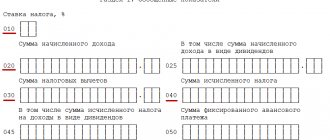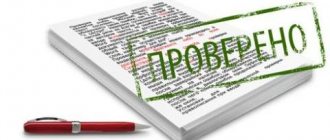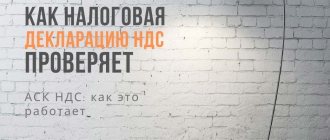We will look at when tax authorities conduct a repeat tax audit.
To begin with, you should know that a repeated desk audit has no right to be carried out (Article 88 of the Tax Code of the Russian Federation, Resolution of the Federal Antimonopoly Service of the North-Western District dated September 26, 2008 No. A66-594/2008). But if the company submits a clarification (for example, regarding VAT), then the fiscal authorities can check the same tax period as part of a new cameral.
A repeated on-site inspection can be carried out in two cases (paragraphs 5, 6, paragraph 10, article 89 of the Tax Code of the Russian Federation). Firstly, if the company provides a clarification for the reduction. Secondly, if a higher authority decides to supervise a lower-level inspection and analyze the quality of its inspection. In this regard, it would be useful to understand what risks arise during such control and how to avoid them.
Carrying out a repeat tax audit in connection with filing an updated return for reduction
Procedure for re-inspection
If the company has submitted an updated declaration for reduction, then as part of the re-inspection, the period for which the update was submitted is examined. The decision to conduct a repeat inspection is made by the inspectorate that conducted the previous inspection. If, during a repeat inspection, violations are revealed that were not discovered earlier, then the inspectors do not have the right to fine the company for newly identified errors. The exception is cases where the failure to detect violations during the initial inspection was the result of a conspiracy between the company and the inspectors (paragraph 7, paragraph 10, article 89 of the Tax Code of the Russian Federation).
The number of repeated on-site inspections is unlimited, since when a repeated inspection is scheduled, the restrictions specified in paragraph 5 of Article 89 of the Tax Code of the Russian Federation do not apply. If an organization has submitted an updated calculation for advance payments, which reflects the amount of tax to be reduced, then the fiscal authorities do not have the right to conduct a repeat inspection, since the basis for its conduct is the submission of an updated declaration (paragraph 6, clause 10, article 89 of the Tax Code of the Russian Federation).
When submitting an amendment for a period that has already been audited, the company should weigh the pros and cons of such a step, especially if the amount of tax to be reduced is very significant. Due to the insignificant amounts, fiscal officials are unlikely to conduct a second on-site inspection, since the amount of additional charges will not be comparable to the labor costs of inspectors. But it will be quite difficult to explain the significant decrease in tax liabilities that occurred as a result of changes in the terms of transactions. This may happen due to a sharp increase in transaction costs in retrospect. A downward adjustment in revenue may occur due to a decrease in price.
Repeated inspection - for what period?
If we talk about what period can be covered by the inspection, then be aware that as part of a repeated inspection, a period not exceeding three calendar years preceding the year of the decision to appoint a repeated inspection can be verified (paragraph 3, clause 10, article 89 of the Tax Code of the Russian Federation ). For example, if a company submits an update for 2012 in 2021, then inspectors will not be able to conduct a re-inspection. At the same time, the company will not be able to return or offset the tax according to such clarification, since an application for offset or refund of overpaid tax can be submitted within three years from the date of its payment (clause 7 of Article 78 of the Tax Code of the Russian Federation, letter of the Ministry of Finance of Russia dated 08.04. 10 No. 03-02-07/1–152).
At the same time, regulatory agencies believe that the inspection has the right to re-check the period specified in the clarification, even if it exceeds three years preceding the year of the decision to conduct a re-check (letter of the Ministry of Finance of Russia dated April 19, 2013 No. 03-02-07/1 /13473, Federal Tax Service of Russia dated July 17, 2015 No. SA-4-7/ [email protected] ). In the ruling of the RF Armed Forces dated 03/05/15 No. 305-KG15-606, it is noted that the Tax Code of the Russian Federation provides for the possibility of submitting an update for a period that is beyond three years. In this regard, the possibility of conducting a repeated audit beyond the specified period is consistent with the principles of tax regulation and does not violate the balance of private and public interests.
When considering such disputes, the courts indicate that in the case of submitting a clarification for a reduction, the inspection is not bound by a three-year period when establishing the period for conducting a re-inspection. A different interpretation of the provisions of paragraph 10 of Article 89 of the Tax Code of the Russian Federation means that the company has the opportunity to reduce tax liabilities down to zero by submitting clarifications at the end of a three-year period (determination of the Supreme Arbitration Court of the Russian Federation dated 08.11.13 No. VAS-15070/13) or at the end of a three-year period (resolution AS Far Eastern dated June 15, 2015 No. F03-2384/2015, FAS West Siberian District dated March 19, 2013 No. A27-14195/2012). This contradicts the position of the Presidium of the Supreme Arbitration Court of the Russian Federation (Resolution No. 8163/09 dated March 16, 2010), according to which the company’s right to submit an updated declaration must correspond to the authority of the fiscal authorities to verify it.
Thus, companies should not count on the fact that inspectors will consider the three-year period to be preemptive and will not order a second on-site inspection if the clarification is submitted after the end of the three-year period or at the end of its expiration. Some organizations mistakenly believe that submitting updated returns in the last days of the tax period will help avoid re-audit for at least one tax period out of three. At the same time, taxpayers count on the fact that inspectors will not have time to make a decision on conducting a re-inspection before the end of the year. Even if the company submits an update on December 29, the inspection may make a decision on the required date. And the organization will not be able to verify this circumstance in any way.
However, some companies are trying to think more creatively. But, as judicial practice shows, it is not always successful. For example, the Federal Antimonopoly Service of the Volga-Vyatka District considered a case where a company initially filed income tax and VAT returns with significant amounts payable. Taxes were paid in full and on time. However, after the on-site inspection, the organization decided to submit adjustments for reduction. And she filed applications for a refund of overpaid taxes. The inspectorate conducted desk audits of the updated declarations and returned the funds. But subsequently, the fiscal authorities ordered a second on-site inspection, as a result of which they presented new claims for VAT and income tax and demanded the company to pay taxes, penalties and fines.
In court, the company insisted that the tax authority assessed additional taxes unlawfully, since it itself returned them based on the results of desk audits. Additional charges arose due to the fault of the inspectors themselves, and the company pays money for their mistakes. However, the court indicated that the reason for the additional assessments for the repeated on-site inspection was the unlawful exclusion of large amounts of revenue from the tax base.
The company initially included the disputed amounts in the initial declarations, and then excluded them from the tax bases by submitting clarifications. The submission of clarifications is not related to corrections of errors that were identified as a result of the previous on-site inspection. This is an independent decision of the organization. The illegality of a tax refund is not the reason for additional assessments upon re-audit. The reason for the new claims was the illegal understatement of revenue in the statements. This resulted in the withdrawal of the corresponding funds from the budget and, as a consequence, the occurrence of arrears (resolution dated July 14, 2014 No. A17-4028/2013).
Sometimes a repeat tax audit is not carried out after submitting amendments to the reduction.
When submitting clarifications for reduction, a repeat on-site inspection is not always required. For example, in one of the cases considered by the AS of the West Siberian District, the company complained that after submitting clarifications after an on-site inspection, the inspectors did not even assign additional tax control measures, not to mention a repeat on-site inspection. In court it turned out that the company had repeatedly submitted clarifications. But she did not provide documents justifying changes in her tax obligations in terms of reducing the amount of income and replacing some expenses with others.
The arbitrators pointed out that the company submitted clarifications so many times that it eventually became confused and was unable to document the actual amount of taxes. Even in court. Consequently, the inspectors had no reason to order a repeat inspection or additional control measures, and additional charges were legal (resolution No. F04-8713/2013 dated February 25, 2015).
The courts do not support fiscal officials in cases where the latter use the opportunity to conduct a second on-site inspection to repeat additional charges, but for other reasons. So, as it was established in the resolution of the Federal Antimonopoly Service of the East Siberian District dated 06/04/13 No. A78-7099/2012. Based on the results of the on-site inspection, the inspectorate denied the company VAT deductions, but was unable to defend the additional charges in court (Resolution of the Federal Antimonopoly Service of the East Siberian District dated September 28, 2011 No. A78-234/2011). The company filed an amended declaration for the reduction for the period that has already been audited. The inspectorate ordered a second on-site inspection and assessed additional VAT for the period already lost in court. However, additional charges as part of the re-inspection concerned a different counterparty. In this regard, the court indicated that the inspection did not have grounds to conduct a repeat on-site inspection, since during the initial inspection, the inspection did not have any claims to the invoices that they disputed as part of the repeat on-site inspection.
Documents requested during inspections that are not related to the subject of the inspection
The Arbitration Court of the East Siberian District considered a case in which inspectors requested a purchase book for the fourth quarter of 2013 from the counterparty of the company being inspected. He refused to present it for the reason that it did not and could not contain information about transactions with the company being audited. The counterparty successfully challenged the fine imposed by the inspectorate. The tax authorities tried to prove that they requested the purchase book only in relation to the purchase of a product (tractor), which was subsequently sold to the audited company. However, the court confirmed that in this case the purchase book as a whole is not a document relating to the activities of the person being inspected. Purely theoretically, controllers could request an extract from the purchase book, but the court itself emphasized that the legislation does not provide for the availability of such a document (Resolution of the Administrative Court of the East Siberian District dated April 13, 2015 No. A19-12487/2014).
We cancel the fine for failure to provide documents
Another example is that for a desk check of the validity of VAT deductions, the inspectorate requested documents from the company confirming the registration of rights to real estate. The organization did not submit them and was fined. The court decided in favor of the company, pointing out that the Tax Code does not establish as a basis for applying VAT deductions the presence of state registration of rights to the taxpayer’s real estate and documents confirming it (Resolution of the Presidium of the Supreme Arbitration Court of the Russian Federation dated April 8, 2008 No. 15333/07).
The Federal Antimonopoly Service of the Far Eastern District came to the conclusion that not any documents and information are considered necessary for inspection, but only those that have a purpose and are intended for tax control. Since the request did not show the connection of the requested documents with the subject of the inspection, there were no grounds for imposing a fine (resolution dated March 13, 2008 No. Ф03-А24/08–2/433).
Repeated on-site tax audit to control a higher tax authority over a lower one
Grounds for conducting a repeat on-site tax audit
A repeated on-site inspection may be appointed by a higher tax authority to monitor a lower-level inspection. Both the Federal Tax Service for a constituent entity of the Russian Federation and the Federal Tax Service of Russia (if the initial inspection was carried out by an interregional inspection) can make a decision to conduct an inspection. In addition to specialists from a higher authority, the inspection team may include employees of the inspectorate that conducted the initial inspection. Practice shows that such a double check is the most unpleasant for both the lower inspection and the company itself.
The reason for ordering a repeat audit may be the unsatisfactory quality of the initial audit. The quality of the audit may be assessed as poor due to the presence of insignificant additional charges, a formal approach to collecting evidence, or due to suspicions that the low amount of additional charges and insignificant coverage of counterparties were the result of collusion between the company and the inspectors. The possibility of the existence of such a conspiracy is directly stated in paragraph 7 of clause 10 of Article 89 of the Tax Code of the Russian Federation.
A repeated on-site tax audit cannot be carried out without reason.
Practice shows that it is not possible to carry out repeated inspections without reason to control a higher authority over a lower one. In the absence of obvious grounds, such a check turns “from a necessary tool of tax policy into a tool for suppressing economic independence, restricting freedom of entrepreneurship and property rights” (Resolution of the Constitutional Court of the Russian Federation dated July 16, 2004 No. 14-P).
This conclusion follows, in particular, from the ruling of the RF Armed Forces dated September 16, 2014 No. 301-KG14-1038. After the repeated audit, the Federal Tax Service did not provide an analysis of the effectiveness of the inspection carried out by the lower inspection in the new inspection report. The court emphasized: in the inspection report, the higher inspection made conclusions based on documents and evidence collected during the re-inspection. This evidence and documents were not cross-checked with the information collected during the initial audit. The decision on the re-inspection lacks not only an analysis of the results of the initial audit, as well as the issues examined during it and the violations identified, but also any mention of the initial audit.
During the trial, the higher inspection did not provide evidence that the initial inspection was ineffective and fragmented. The Federal Tax Service did not prove that the initial audit was not aimed at verifying the circumstances reflected in the re-inspection report (Resolution of the Federal Antimonopoly Service of the Volga-Vyatka District dated April 25, 2014 No. A29-1670/2013). This means that the inspection carried out by a higher inspection is not repeated, but new. Moreover, its goal was to unreasonably increase the company’s tax burden. At the same time, the legality of the inspection conclusions made during the initial inspection was not questioned by the Federal Tax Service and was not refuted.
Another interesting case about the legality of a higher authority conducting a repeat inspection was considered in the resolution of the Moscow District Court of December 21, 2015 No. A40-57636/15. In this case, due to the expiring three-year period (paragraph 3, clause 10, article 89 of the Tax Code of the Russian Federation), the Federal Tax Service of Russia ordered a second on-site inspection, without waiting for a decision on the initial inspection. The initial inspection report was delivered to the company on December 1, 2014. But already on December 30, 2014, the Federal Tax Service of Russia made a decision to order a repeat inspection. Little of! The decision to order a re-inspection was made only in relation to one tax.
The court indicated that the inspection ends from the moment the inspection certificate is drawn up, and based on its results, an inspection report is drawn up. The report reflects both the results of control activities and the conclusions of inspectors, on the basis of which a decision on the inspection will subsequently be made. Article 89 of the Tax Code of the Russian Federation does not contain instructions that a repeat inspection can be ordered only after a decision has been made on the initial inspection. In addition, the court noted that paragraph 10 of Article 89 of the Tax Code of the Russian Federation does not prohibit rechecking only one of them instead of all taxes.
Analytical accounting documents requested
When conducting an audit, tax authorities often require analytical accounting documents from an organization: its general ledger, balance sheets, account statements and other analytical accounting documents that are not primary. However, even the Federal Tax Service confirms that such a requirement is unlawful (letter dated September 13, 2012 No. AS-4-2 / [email protected] ).
The courts agree with this, emphasizing that analytical accounting documents do not contain the information necessary for calculating taxes and fees. Decisions in favor of companies are contained in decisions of the Federal Antimonopoly Service of the North-West dated 04/18/13 No. A56-26755/2012, West Siberian of 03/26/13 No. A03-7357/2012, Moscow dated 03/01/13 No. A40-12594/12-90- 60, Far Eastern district No. F03-5163/2011 dated October 26, 2011, North Caucasian district No. A53-23465/2010 dated October 7, 2011.
Documents within the framework of a desk audit on VAT that inspectors have the right and not the right to require
Tax audit during liquidation and reorganization of companies
How is a tax audit carried out during liquidation?
On-site inspections during the reorganization or liquidation of a company (clause 11 of Article 89 of the Tax Code of the Russian Federation) are repeated in nature. At the same time, the procedure and conditions for conducting them, the period of coverage, and the powers of inspectors coincide with the rules established for repeated inspections.
An on-site inspection carried out in connection with the reorganization or liquidation of an organization may be appointed regardless of the time and subject of the previous inspection. The decision to conduct an audit during reorganization or liquidation is made by the tax authority with which the company is registered.
It is obvious that the coverage of organizations with on-site inspections is small. During reorganization (Article 57 of the Civil Code of the Russian Federation), it is most advisable for fiscal officials to check cases of merger of profitable companies with unprofitable ones or cases of merger of unprofitable companies with profitable ones. Especially if the largest taxpayers are involved in the reorganization.
At risk are companies that are trying to merge with an organization that is on the verge of bankruptcy. With such a merger, all liquid property and current assets are usually lost or exchanged for bills of exchange. And the connecting (fusion) balance sheet, which is compiled when several organizations merge into one legal entity, plays the role of a black hole. Those who like to migrate multiple times from one inspection to another are also at risk. In this case, companies migrate through reorganization in the form of incorporation or merger. Deregistration due to reorganization-migration will entail a lightning-fast appointment of an audit.
Migration will not help avoid on-site inspection. On the contrary, the inspection will come even faster, since inspectors must have time to make a decision on scheduling an on-site inspection before making an entry in the Unified State Register of Legal Entities about a change in the location of the legal entity. Moreover, the inspectorate with which the organization is registered until a record of a change of location is made in the Unified State Register of Legal Entities has the right to make a decision to conduct an on-site inspection on the day of deregistration (letter No. ED-4-2/22699 dated December 24, 2015). That is, inspectors can calmly conduct an inspection of their already former ward. Even if the inspection does not have time to make a decision, there is always the opportunity to conduct an inspection at another inspection. But already in relation to the legal successor, to whom the rights and obligations of the legal predecessor are transferred (clauses 1, 2 of Article 58 of the Civil Code of the Russian Federation, clauses 1–5 of Article 50 of the Tax Code of the Russian Federation).
In the ruling of the Supreme Arbitration Court of the Russian Federation dated December 23, 2013 No. VAS-18603/13, the court recognized the legality of an inspection of a legal successor whose legal predecessor ceased operations, since it does not follow from the norms of the Tax Code of the Russian Federation that an inspection that did not have time to conduct an on-site inspection in connection with the reorganization of the company loses the right to conducting an audit of its successor for the period preceding the reorganization. Thus, the legal successor can be checked for the periods preceding the reorganization (determination of the Supreme Arbitration Court of the Russian Federation dated May 19, 2008 No. 5863/08). At the same time, he is presented with notifications, an act and a decision on the inspection, and a demand for payment of taxes. In case of evasion from receiving these documents, the court may find that the assignee deliberately did not provide the inspection with contact addresses for receiving the documents. That is, he evaded receiving them in hopes of canceling the inspector’s decision in court (Resolution of the Federal Antimonopoly Service of the Moscow District dated July 29, 2014 No. A40-132198/2013).
The most vulnerable audit for tax authorities is a tax audit during liquidation
Due to the increase in time limits for pre-trial appeals, the final decisions on inspections of liquidated organizations may simply not have time to enter into legal force. Knowing this, many liquidated companies try to do everything to postpone any meetings with inspectors. Some of them claim that there are no premises for conducting inspections, that documents are transferred to the liquidator from one region to another, others are trying to limit all communication with inspectors through mail. Delaying deadlines is the main trump card of companies. Inspectors, however, also have some rights. For example, they can involve police officers and determine taxes by calculation (clause 1 of Article 36, subclause 7 of clause 1 of Article 31 of the Tax Code of the Russian Federation).
However, the calculation method is not always reliable and may not hold up in court. Therefore, inspectors can issue a very detailed requirement on bank statements for several thousand contracts and invoices. As a rule, no one presents these documents. And the inspector has a reason to draw up a separate act for failure to submit documents and much more quickly issue a demand for payment of a separate fine (Article 126 of the Tax Code of the Russian Federation).
The presence of arrears can significantly delay the liquidation procedure. There was a case when a taxpayer feverishly paid a fine of 500 thousand rubles in order to be liquidated without delay. Otherwise, according to the results of the audit, the result would have been more disastrous. Unfortunately, after paying this fine, due to the lack of personal communication with the fiscal authorities, the company managed to liquidate before receiving a decision on the inspection. Therefore, in practice, inspectors manage to hand over decisions to those companies that have a significant amount of assets (property, accounts receivable, etc.), since their implementation takes time and increases tax liabilities.
Please also pay attention to these articles:
- Additional charges after an on-site audit can be included in the tax base
- Tax losses and the commission for their consideration: personal experience








